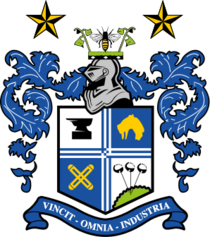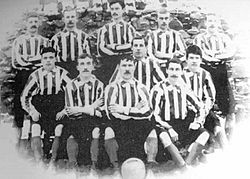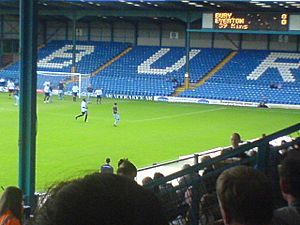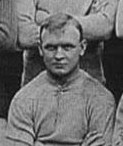Bury F.C. facts for kids
 |
|||
| Full name | Bury Football Club | ||
|---|---|---|---|
| Nickname(s) | The Shakers | ||
| Founded | 1885 | ||
| Ground | Gigg Lane | ||
| Capacity | 12,500 | ||
| Owner | Football Supporters' Society of Bury Limited (50+1) | ||
| Manager | Dave McNabb | ||
| League | None (expelled from League One) | ||
| 2019–20 | League One, 24th of 24 (expelled) | ||
|
|
|||
Bury Football Club is an English association football team from Bury, Lancashire. They are known as The Shakers and play in white shirts and navy blue shorts. Their home ground, Gigg Lane, has been used since 1885.
Bury FC recently played in the Premier Division of the North West Counties League, which is the ninth level of English football. In April 2025, they won promotion to the Northern Premier League West Division, the eighth level. This happened after Bury FC merged with a new club called Bury AFC in 2023. Before facing financial problems and being removed from the English Football League in 2019, Bury FC played in EFL League Two, the fourth level.
The club was started in 1885. They were one of the first teams in the Lancashire League in 1889, winning it twice. They joined the Football League in 1894. Bury has long-standing rivalries with nearby teams like Bolton Wanderers, Oldham Athletic, and Rochdale.
Contents
- Club History: From Founding to Today
- Early Days and the "Shakers" Name: 1885–1895
- FA Cup Glory and Top League Years: 1895–1929
- Ups and Downs in the Lower Leagues: 1929–2019
- Financial Crisis and EFL Expulsion: 2019
- Bury AFC: A New Beginning (2019–2023)
- The Merger: Bury FC Returns to Gigg Lane (2023)
- North West Counties League (2023–2025)
- Team Colors and Crest
- Gigg Lane: Bury's Home Stadium
- Players and Coaching Staff
- Managerial History
- Bury FC Women
- Club Achievements
- Records and Statistics
- Club Support and Mascots
- Rivalries
- See also
Club History: From Founding to Today
Early Days and the "Shakers" Name: 1885–1895
Bury Football Club began on April 24, 1885. Two local church teams, Bury Wesleyans and Bury Unitarians, decided to join forces. They wanted to create a professional football team right from the start.
The club rented land at Gigg Lane from the Earl of Derby's family. Their first game there was a friendly match on September 12, 1885, which Bury won 4–3.
Bury first entered the FA Cup in 1887–88. They were supposed to play Blackburn Rovers but decided not to, playing a friendly game instead.
In 1889, Bury helped start the Lancashire League. They finished second in the first season and then won the championship for the next two years. In 1892, they won the Lancashire Senior Cup for the first time. Bury has won this cup eleven times in total, most recently in 2018.
The club's famous nickname, "The Shakers," came from the 1892 Lancashire Cup final. Before the game, the club's chairman, J. T. Ingham, told his players: "We shall shake 'em! In fact, we are the Shakers." The media loved this, and the name stuck!
In 1894, Bury joined the Football League. In their very first season, 1894–95, they won the Second Division title. They then beat Liverpool in a special "test match" to get promoted to the top league, the First Division.
FA Cup Glory and Top League Years: 1895–1929
Bury stayed in the top league for 17 seasons. They won the FA Cup twice, in 1900 and 1903. In these two finals, they scored ten goals and didn't let the other team score any!
In the 1900 final, they beat Southampton 4–0. Bury's journey to this final was amazing because they played every game away from home.
Three years later, in the 1903 final, Bury didn't let in a single goal throughout the entire competition. They played against Derby County and won by a record-breaking score of 6–0! Six players from the 1900 winning team were also in the 1903 team. Derby's goalkeeper got injured during the game, and since substitutes weren't allowed back then, one of their defenders had to play in goal. This made it even harder for Derby. Bury's 6–0 win was the biggest winning margin in an FA Cup final for many years. The ball from this historic final is now on display at the National Football Museum.
In 1922, the club received a wonderful gift: the Earl of Derby gave them full ownership of their home ground, Gigg Lane. Bury returned to the First Division in 1924 and achieved their highest-ever league position, finishing fourth in 1925–26. They were last in the top league in 1929.
Ups and Downs in the Lower Leagues: 1929–2019
After 1929, Bury spent many years in the Second and Third Divisions. In the 1930s, they came close to returning to the top league, finishing third in 1936–37.
During World War II, regular football stopped. Bury played in regional wartime leagues and even won the North West League in 1939–40.
In 1957, Bury dropped into the third tier for the first time. But in 1960–61, under manager Dave Russell, a young Bury team won the Third Division championship. They spent seven of the next eight seasons back in the Second Division. A famous player, Colin Bell, who later played for England, was Bury's best player from 1963 to 1966.
In 1971, Bury went down to the Fourth Division for the first time. They earned promotion in 1974. In 1985, the club celebrated its 100th birthday by getting promoted back to the Third Division.
In the mid-1990s, manager Stan Ternent led the team to two promotions in a row. In 1996, they moved up to the third tier, and in 1996–97, they won the third-tier title, returning to the second tier for the first time in 30 years! They stayed there for two seasons before dropping back down.
In 2001–02, Bury faced serious financial problems and almost closed down. Fans started a campaign to raise money, which helped save the club. In 2005, Bury became the first club to score 1,000 goals in each of England's top four professional leagues.
In 2010–11, Bury won promotion to League One. After that, they moved between League One and League Two, getting promoted twice (2014–15 and 2018–19) and relegated twice (2012–13 and 2017–18). In 2018–19, Bury finished second in League Two, earning promotion to League One.
Financial Crisis and EFL Expulsion: 2019
Despite their success on the field, Bury FC had big financial problems. In December 2018, businessman Steve Dale bought the club for just £1. However, the money troubles continued. Staff and players weren't paid on time, and the club faced legal action over unpaid debts.
To try and save the club, a plan was made to pay off creditors. This plan was approved in July 2019. However, the English Football League (EFL) needed proof that Bury could pay its debts and continue to operate. Bury couldn't provide this proof in time.
On August 27, 2019, the EFL announced that Bury's membership in the league was withdrawn. This meant Bury FC was removed from the Football League, the first club to be expelled since 1992. This was a very sad day for the club and its fans.
What Happened After the Expulsion
After being expelled, Bury FC went into administration in November 2020. This is a process where experts take over to try and sort out a company's financial problems.
In February 2022, a group of Bury fans called Est.1885 managed to buy Gigg Lane, the club's historic stadium, from the administrators. They also bought the Bury FC name and its history. This was a huge step towards bringing football back to Bury.
Bury AFC: A New Beginning (2019–2023)
While the original Bury FC was struggling, a group of supporters decided to start a new club in December 2019. They called it Bury Association Football Club (Bury AFC). This new club was owned by its fans, meaning members had a say in how it was run.
Bury AFC joined the North West Counties Football League, which is the tenth level of English football. Their first competitive game was in September 2020. In the 2021–22 season, Bury AFC won their division and were promoted to the NWCFL Premier Division.
The Merger: Bury FC Returns to Gigg Lane (2023)
In May 2022, discussions began about merging the two main fan groups: the Bury FC Supporters Society (who owned Gigg Lane and the Bury FC name) and the Shakers Community Society (who owned Bury AFC). The goal was to bring Bury FC back to its home ground.
After some initial challenges, members of both groups voted to merge the two clubs on May 5, 2023. On June 5, 2023, the FA confirmed that the name "Bury Football Club" could be used again in competitions. This meant Bury FC, with its combined history, would play in the North West Counties League Premier Division.
On July 8, 2023, Bury FC played their first game back at Gigg Lane since 2019. It was a pre-season friendly against Bradford City.
North West Counties League (2023–2025)
After a change in manager to Dave McNabb, Bury FC finished third in the league in 2023–24. They lost in the play-off final, missing out on promotion.
However, on April 19, 2025, Bury defeated Burscough 4–0 on the final day of the 2024–25 season. This win, in front of 8,719 supporters, earned them promotion as champions to the Northern Premier League West Division!
Team Colors and Crest
Bury's team colors have usually been white and either navy blue or royal blue. They started with a half sky blue and half chocolate brown shirt, but soon changed to the all-white shirt before joining the Football League in 1894.
The club's crest (logo) on the shirt shows the coat of arms of the former area of Bury. It has pictures that represent the town's industrial past, like an anvil (forging), a fleece (wool), shuttles (cotton), and a papyrus plant (paper). The motto on the crest says Vincit Omnia Industria, which means "work conquers all."
Gigg Lane: Bury's Home Stadium
Bury has played at Gigg Lane since 1885. The first Football League match there was on September 8, 1894, when Bury beat Manchester City 4–2. The stadium got permanent floodlights in 1953.
Before it was rebuilt in the 1990s, Gigg Lane could hold 35,000 fans. The record attendance was on January 9, 1960, when 35,000 people watched Bury play Bolton Wanderers in an FA Cup match.
After being rebuilt, Gigg Lane now has seats for 12,500 people, all covered. The Main Stand is on the north side and has the club offices. Away fans sit at the Manchester Road End.
When Bury FC was expelled from the EFL in 2019, Gigg Lane was known as the Planet-U Energy Stadium due to sponsorship. It was even powered by renewable energy!
For a while, when Bury FC and Bury AFC were separate, Bury AFC played their home games at Stainton Park in Radcliffe. But now, with the merger, Bury FC is back home at Gigg Lane.
Players and Coaching Staff
Current Squad
Here are the players currently in the Bury FC squad:
|
|
Players Who Played for Their Country
Many players from Bury FC have also played for their national teams. Jimmy Settle was the first Bury player to play for England in 1899, scoring three goals in one game! Bill Gorman and Derek Spence played the most international games while at Bury, each earning 10 caps for Ireland and Northern Ireland.
Neil Danns was the most recent Bury player to play for his country, representing Guyana in 2019.
| Player | Country | Caps | Goals | Year(s) of caps | Notes | |
| Bill Gorman | Ireland (FAI) | 10 | 0 | 1936–1938 | ||
| Derek Spence | Northern Ireland | 10 | 1 | 1975–1976 | ||
| Jimmy Chambers | Ireland (IFA) | 8 | 2 | 1927–1930 | ||
| Neil Danns | Guyana | 6 | 6 | 2018–2019 | 1 | |
| Bhaichung Bhutia | India | 6 | 2 | 2000–2001 | ||
| Norman Bullock | England | 3 | 2 | 1923–1926 | ||
| Phil Hughes | Northern Ireland | 3 | 0 | 1986–1987 | ||
| Jimmy Settle | England | 3 | 4 | 1899 | ||
| Charlie Sagar | England | 2 | 1 | 1900–1902 | ||
| David Healy | Northern Ireland | 2 | 1 | 2012–2013 | ||
| Hugh Tinney | Scotland | 2 | 0 | 1967 | ||
| Lutel James | St Kitts and Nevis | 2 | 0 | 2000 | ||
| Jack Ball | England | 1 | 0 | 1927 | ||
| Tom Bradshaw | Scotland | 1 | 0 | 1928 | ||
| Billy Hibbert | England | 1 | 0 | 1910 | ||
| Jack Plant | England | 1 | 0 | 1900 | ||
| Jap Walker | Ireland | 1 | 0 | 1911 |
1 Danns scored three goals in qualifying games, then three in three games in the 2019 CONCACAF Gold Cup group stage.
Other Famous Players
Many other well-known players have played for Bury, some before or after playing for their national teams:
- Colin Bell: A midfielder who played for Bury as a teenager and became captain. He later played 48 times for England.
- Luther Blissett: An England international who played briefly for Bury at the end of his career.
- Lee Dixon: Played for Bury before becoming a famous defender for Arsenal and England.
- Dean Kiely: A goalkeeper for Bury who later played for the Republic of Ireland.
- Kasper Schmeichel: A goalkeeper who had loan spells at Bury and later became a star for Denmark.
- Neville Southall: Started his career as a goalkeeper at Bury before becoming a legend for Everton and Wales.
Managerial History
The club was founded in 1885, but the first official team manager was Archie Montgomery in 1907. Before that, committee members looked after the team.
Norman Bullock, who scored many goals for the club, managed Bury twice. The longest-serving manager was Dave Russell, who led the team for eight years and won the Third Division championship in 1960–61.
In the late 1990s, Stan Ternent led Bury to two promotions in a row, taking them from the fourth tier to the second. After the club's financial troubles, former Bury striker Ryan Lowe became manager in 2018 and helped them win promotion to League One in 2019, just before the club's expulsion from the EFL.
Bury FC Women
Bury FC also has a women's team, Bury FC Women, started in 1996. They played in the North West Women's Regional Football League for many seasons. In 2018–19, they won their division and were promoted.
After the main Bury FC club faced problems, the women's team also struggled but managed to keep going with help from charities. They used to play many games at Gigg Lane. On April 24, 2022, they were the first team to play at Gigg Lane since May 2019, winning their match 3–0.
In the 2021–22 season, Bury FC Women won their division title. Now, they play their home games at Gigg Lane, just like the men's team.
Club Achievements
Bury FC has won several important titles throughout its history:
League Titles
- Second Division (level 2)
- Champions: 1894–95
- Third Division / Second Division (level 3)
- Champions: 1960–61, 1996–97
- North West Counties Football League Premier Division (level 9)
- Champions: 2024–25
- North West Counties Football League Division One North (level 10)
- Champions: 2021–22
Cup Wins
- FA Cup
- Winners: 1899–1900, 1902–03
- Lancashire League
- Winners: 1890–91, 1891–92
- Lancashire Cup
- Winners (11 times): 1892, 1899, 1903, 1906, 1926, 1958, 1983, 1987, 2014, 2015, 2018
- Manchester Cup
- Winners (12 times): 1894, 1896, 1897, 1900, 1903, 1905, 1925, 1935, 1951, 1952, 1962, 1968
Records and Statistics
English Football Records
- Bury holds the record for the biggest winning margin in an FA Cup Final (6–0 against Derby County in 1903). Manchester City also achieved this score in 2019.
- In 2005, Bury became the first (and only) club to score 1,000 goals in each of England's top four professional football leagues.
Club Records
- Highest league finish (before 2019): 4th in the First Division, 1925–26
- Highest league finish (after 2020): 1st in the North West Counties Football League Premier Division, 2024–25
- Record league victory: 10–1 vs Skelmersdale United, 2024
- Record cup victory: 12–1 vs Stockton, FA Cup, 1897
- Top goalscorer in a season: Craig Madden, 43 goals in 1981–82
- Top goalscorer in a career: Craig Madden, 153 goals from 1977 to 1986
- Most appearances: Norman Bullock, 539 games from 1920 to 1935
- Youngest player in a league game: Jimmy Kerr – 16 years and 15 days
- Oldest player in a league game: Bruce Grobbelaar – 40 years and 337 days
- Record attendance: 35,000 vs Bolton Wanderers, FA Cup, 1960
Club Support and Mascots
The club has a supporters group called Forever Bury, which was started in 2002 to help the club with its financial difficulties.
Bury has had a club mascot since 1997. The first was "Robbie the Bobby," a cartoon policeman. He sometimes caused trouble and was even sent off the field by referees! In 2018, he was replaced by a cartoon police dog named "Peeler," chosen by children in a competition. Peeler made his debut in August 2018.
Rivalries
Bury has several local rivals because many other football clubs are nearby. Their main rivalry has always been with their closest neighbor, Bolton Wanderers. The two teams have played many exciting games over the years.
In recent times, matches between Bury and Rochdale have been called the "M66 Derby." Other rivals include Oldham Athletic, Stockport County, and Blackburn Rovers.
See also
 In Spanish: Bury Football Club para niños
In Spanish: Bury Football Club para niños
 | Selma Burke |
 | Pauline Powell Burns |
 | Frederick J. Brown |
 | Robert Blackburn |




